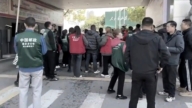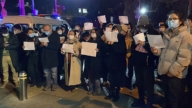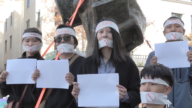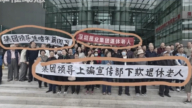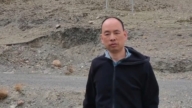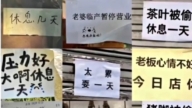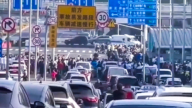【新唐人2013年01月12日讯】在社会各界强烈的“废除劳教制度”的呼声中,中共中央政法委书记孟建柱终于在1月7号宣布“停用”劳教制度。正当举国上下打算为此欢呼时,一盆凉水当头泼下,消息传出,另一个类似劳教制度的法律正在拟定,所谓劳教改革只是换了个“马甲”而已。
《百度》百科是这样定义劳教制度的:劳教制度就是公安机关“无须经过法院审讯定罪”,就可将疑犯投入劳教场所,实行最高限期为四年的“限制人身自由、强迫劳动、思想教育”等措施。自从中国大陆实施劳教制度以后,就多出了无数的冤假错案,劳教所里多出了无数被迫害致死的冤民。
大陆民权律师唐吉田向《新唐人》表示,劳教制度是一个恶法,它既违反国际人权公约的相关原则,也与中国大陆现行法律,比如说像宪法、律法法等相冲突。
唐吉田:“这样一个制度它不经过司法审查,就由警察一家就可以决定对公民人身自由剥夺,少则一到三年,甚至可以达到四年,那么这个过程就是非常封闭、非常不透明的一种状态下,公民没有任何救济的手段。”
吉林省伊通县法院副院长郭学宏,因为反对庇护被告人,而被劳教一年。未经任何手续,仅仅一个电话,就让郭学宏失踪了四年。
根据大陆官方2008年底统计,有近16万人未经审判而监禁在全中国约350个劳教场所中。当然,实际的人数应该更多,而且还在逐年递增着。
唐吉田:“特别是近年来所谓的维稳,将劳教的对像扩大化,包括后来出现的因为信仰,或者土地被征用,或者其他一系列人群,面临着劳教这种威胁。”
劳教制度的“随意关押性”,使劳教成为了中共当局打压异议人士最趁手的工具。中共的警察打着“维稳”的旗号,可以随时、任意、无理由的抓捕和关押他们认为“对社会有危害”的人。而无人监管和利益的驱使,使得劳教人员成为劳教所牟利的工具。
法轮功学员闰生:“所谓的管理和教育就是基本上打骂为主,每天基本上从早上到晚上都是去干活,为教养院和警察谋福利,最忙碌的时候三天三宿没让睡觉。”
《新唐人》记者:“你被劳教有什么法律程序吗?”
法轮功学员闰生:“没有,它连教养票都没有给我,就是给我一个口头通知。”
99年之后,由于中共大肆镇压法轮功,使得各大劳教所爆满,不得不提前释放一些真正的犯人给法轮功学员“腾地方”,使得法轮功学员成为中国劳教所的“主要成员”。
但随着中共专制高压统治的升级,和互联网时代的到来,维权者、上访申冤者、和网路活跃人士,逐渐成为劳教所里的“新成员”。
北大法学研究生,维权人士曹顺利,因为多次到国家新闻办,呼吁给予访民合法上访权,而被警方以“寻衅滋事”罪名,关押到“北京女子劳教所”23个月。
曹顺利:“他们名义上是劳动教养、教育,其实就是对你进行精神摧残,就是叫你们认罪,服从他们那种不公正的处罚。要是不认罪,受的惩罚比判了大刑的人还要重。”
曹顺利说,劳教采用“严管”和“开放”式两种管理方式,而“严管”手段一般用于法轮功学员和极少数访民身上。
曹顺利:“好多上访的和法轮功都不认罪,那么就永远严管状态,所谓的严管状态,管理的手段特别不人道,特别黑恶和残忍。他们严管的目地就是摧残你的精神和意志,然后摧残你的身体。”
唐吉田提出,劳教制制度必须彻底废除干净,而所谓的“劳教改革”只是换一个名目继续苟延残喘。更何况,即使废除劳教,只要司法不独立、媒体、言论不自由,根本上,人权问题还是无法得到解决。
采访/朱智善 编辑/张天宇 后制/王明宇
New Identity of Re-Education through Labor System in China
The system of re-education through forced labor (RTL)
in China has long been the target of public criticism.
On January 7, Meng Jianzhu, new chief of the Political &
Legislative Affairs Committee of the Chinese Communist
Party (CCP) announced the RTL system will be “disabled”.
Yet, sources said that the CCP regime
is drawing up a law similar to RTL system.
The regime’s touting the reforming of the RTL
system is merely gives the system a new identity.
Baidu-encyclopedia defines that the re-education through
labor system (RTL) is a detention punishment issued
by police, instead of through the judicial system.
Detainees are forced to engage in penal labor
and are subjected to political education.
The longest sentence spans four years.
Over decades, the RTL system in China has
given rise to countless victims and unjust cases.
Tang Jitian, a civil rights lawyer in China,
says that the RTL system is an evil law.
It’s against the principles of international human rights.
It also conflicts with China’s existing laws
including the Constitution and regulations and laws.
Tang Jitian: “RTL sentences aren’t
given through the judicial system.”
Rather, the public security organ has the
authority to deprive citizens’ physical liberty
for one to three years, and even up to four years.
This is a very closed proceeding unknown to the public.
Under this system, a citizen victim
is unable to resort to effective legal aid.”
Guo Xuehong, Court Vice President in Yitong,
Jilin Province, was given a one-year RTL sentence,
As he had against the harboring of an unusual defendant.
Guo Xuehong only got a telephone notification,
without getting through any judicial proceeding.
He was held in a secret place for four years since.
As of the end of 2008, CCP official data showed
that there were about 160,000 RTL detainees
held in 310 re-education centers in China.
The actual number is speculated
to be higher, and grows yearly.
Tang Jitian: “In particular, in recent years,
the alleged maintaining stability has
broadened the scope of RTL detainees.
For example, the RTL sentences were later
used to detain persons who have different
beliefs from the Chinese Communist Party.
This includes victims of officials grabbing
land, and other groups of dissidents.”
The RTL system has become the best tool for the CCP
cracking down on dissidents via “arbitrary detention”.
This enables the police, at any time, and without any cause,
to arrest or detain any person deemed “dangerous to society”.
A lack of supervision and motivation by profit has
made RTL camps to use detainees as tools for profit.
Run Sheng, Falun Gong practitioner: “Its so-called
management and education is basically scolding detainees.
Basically, they’re forced to do penal labor all day and
night,to earn money for the RTL camps and the police.
I recall that at the busiest times, the detainees
weren’t allowed to sleep for three days and nights.”
NTD reporter: “Did you go through any
legal proceedings during the RTL sentence?”
Run Sheng: “No, they didn’t even give me any
written notification for it. Just a verbal notice.”
Since 1999, when the CCP regime began
to openly suppress Falun Gong, nationwide
RTL camps have become filled to capacity.
The authorities had to release some real criminals
to “make room” to detain Falun Gong practitioners.
The major portion of the RTL detainees
are Falun Gong practitioners.
Later on, as the CCP tightens its control over
the public, as well as the spread of the internet,
China’s rights defenders, petitioners and online
activists gradually become RTL camp members.
Rights defender Cao Shunli was
a graduate of Peking University.
Cao appealed to the CCP State Council Information
Office, to endow citizens with their right to petitioning.
The police charged her with the crime of provocation.
They detained her in Beijing Women’s
Forced Labor Camp for 23 months.
Cao Shunli: “Publicly, it is named
re-education, but in fact, it is a mental torture.
That is, they forced you to admit you are
guilty and to receive their unjust punishments.
Otherwise, you’ll be subjected to heavier punishments
than those criminals who are given heavy sentences.”
Cao Shunli reveals that there are two types of RTL
management, the hard-lined and the open-ended.
Hard-line conditions is applied to Falun Gong
practitioners and a few petitioners, she says.
Cao Shunli: “Lots of petitioners and Falun Gong
practitioners refuse to admit that they are guilty.
So they’re placed under hard-line conditions,
and subjected to very inhumane tortures.
The goal of this treatment is to destroy
your will and belief, then ruin your health.”
Tang Jitian advocates the complete
abolition of the RTL system.
He says that so-called “RTL
reform” is a change in name only.
Without an independent judiciary and freedom of speech,
China’s human rights violations cannot be truly solved
with abolition of the RTL system alone, says the lawyer.



